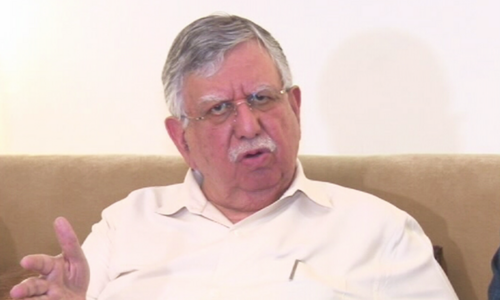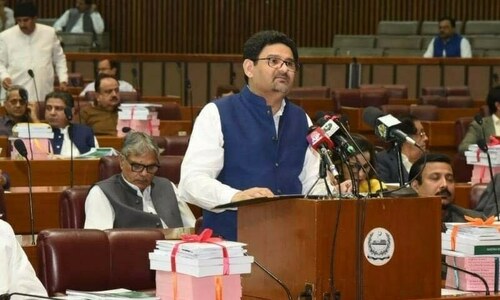Next year’s budget has something for everyone — from laptops for students to tax relief for the inflation-stricken salaried class, savers and small business owners to loans for youth to salary bumps for civil servants to sales tax cuts for the agriculture and industry and finally, petroleum levy as part of massive fiscal consolidation for the International Monetary Fund (IMF).
The first budget of the two-month-old coalition, which Finance Minister Miftah Ismail said a day earlier could be it’s last before the next election, isn’t a ‘reform’ budget. Nor does it seek to permanently tackle the inherent structural imbalances in the economy, which every few years lead to an economic bust following each short boom and brings Pakistan back to the IMF’s doors for its bailout.
Expecting major reforms from the PML-N, or any other party for that matter, at a time when it is faced with a major political challenge from its adversary, Imran Khan’s PTI, trying to force an early election in the country would be naive. Then, who said the PML-N is known for undertaking reforms? Or we might not be facing this day today.
At best, the budget targets near-term challenges facing the nation and is an attempt to steer the flagging economy out of its current crisis through the revival of the suspended IMF bailout package that would also unlock financing from the other bilateral and multilateral lenders and ease Pakistan’s balance of payments difficulties.
The lacklustre budget has populist measures but its projected numbers are blind to the realities of elevated oil prices that can snowball into higher inflation
At the same time, it should be recognised that it puts a little bit of cash in the pockets of the low to middle-income groups of society to somewhat offset the impacts of the surging fuel and power prices while shifting part of the burden of the IMF-mandated stabilisation plan on to the affluent classes.
That it still proposes to recover around Rs135 billion through taxes on real estate holdings of the rich and Rs18bn from their foreign assets, and collect Rs38bn from all persons — high-net-worth individuals and businesses — with income exceeding Rs300 million and Rs30bn from retailers should be appreciated.
Likewise, it has done well by slapping 10 per cent duty on the imports of motor spirit under the Free Trade Agreement with China. The action will yield Rs30bn. In all, the coalition has imposed new, mostly direct, taxes of Rs440bn on the wealthy while providing relief of Rs85bn to the voters to help them cope with the upcoming hefty increase in fuel, power and gas prices.
“Economic stability is our foremost priority… we have to set strong foundations of economic development that are based on sustainable growth,” said Mr Ismail in his budget speech and added that economic growth would be derived by boosting exports, particularly of agriculture, information technology and industrial products.
“The coalition government has taken difficult decisions and will continue taking these difficult actions to stabilise the economy. These are tough times brought upon us by the economic mismanagement of the PTI government during the last four years.
“This budget is the first step to steer the country out of the challenges by taking tough decisions while minimising the impact on the vulnerable segments of society.”
As mentioned above, the initial impressions of the budget clearly show that Mr Ismail has tried to balance the IMF-mandated austerity with measures that basically seek to please the voters during the last year of the present term of the assemblies.
However, most analysts feel that the execution of the budget plan will be much tougher for the coalition than cobbling it together in the backdrop of elevated global oil and commodity prices, as well as expected economic slowdown due to the austere policies.
The targeted economic growth rate of 5pc and inflation of 11.5pc for the next year appear quite unrealistic and unattainable. Independent forecasts project the economy to grow by 3-3.5pc and inflation to jump far above the target on the back of rising international oil and commodity prices.
Should the oil prices surge further or stay elevated, it will become more difficult for the government to recover the full amount of petroleum levy (Rs750bn) and sales tax on oil from consumers or even raise the prices further.
Likewise, few believe that the Rs9 trillion — Rs7tr tax and Rs2tr non-tax — revenue target will be achieved despite higher than targeted inflation because of import compression.
Most analysts argue that the implementation of the budget largely hinges on the emerging political situation in the country over the next few weeks and months, as well as global oil and commodity prices as they will determine the outlook on Pakistan’s macroeconomic targets for the next financial year and the ease with which the government can achieve them.
Thus, the real challenge for the government will be the implementation of the budget. In case of a revenue shortfall, the IMF may ask for more fiscal actions to fill the gap.
The next fiscal year will be extremely tough for ordinary Pakistanis. But it is going to be tougher for the coalition government. If it survives the present challenging domestic and international economic milieu over the next quarter or two, it will be an easy sail for the PML-N and its coalition partners through to the new elections.
Published in Dawn, The Business and Finance Weekly, June 13th, 2022















































